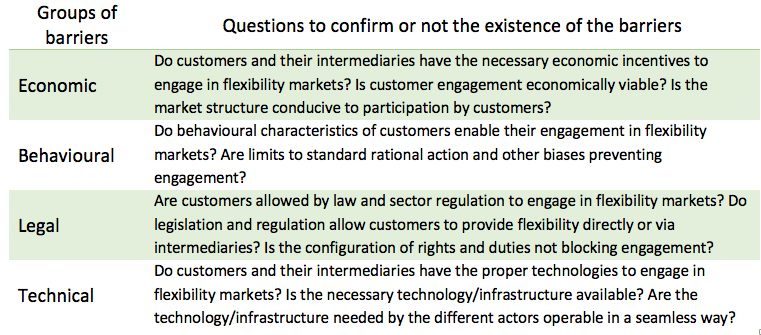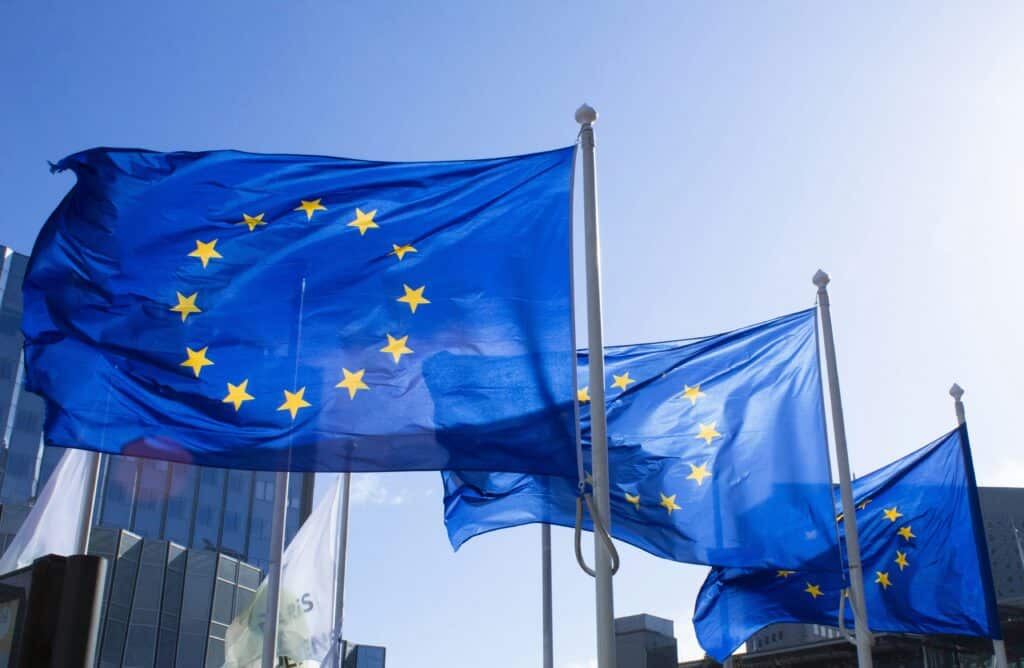Flexibility from consumers: four set of barriers to overcome
This is the third and conclusive installment of the Topic of the Month: Energising engagement
After exploring the rise of a new energy universe, we delved into the intricacies of consumer decisions within a liberalised energy market. Here, we conclude by addressing the barriers to customer engagement in flexibility markets.
The power sector is currently experiencing a transformative change, with flexibility in consumption becoming increasingly valuable. However, there is abundant evidence that engaging customers in the provision of flexibility is difficult. Several barriers have been detected and numerous recommendations to overcome them discussed. In what follows, we present the results of research on customer engagement strategies conducted within the Horizon project OneNet.
Four groups of barriers to customer engagement can be identified when looking at flexibility markets: economic, behavioural, legal, and technical (see Table 1). Each group of barriers can be further divided into a series of sub-categories that make easier the identification of the possible policy recommendations.

Economic barriers and recommendations
Economic barriers in flexibility markets encompass limited value of flexibility, risky businesses, and market and product design. The value of flexibility in the emerging markets where it is traded often falls short of the costs consumers must bear, discouraging participation, especially by residential customers, and small and medium-sized enterprises. High upfront investments further impede involvement. Volatility in the price of system services and the difficulty in predicting what will happen in the future complicate any profit estimation, generating risks and uncertainty that many consumers do not want to confront. Administrative costs, a core concern in market design, dissuade participation due to their disproportionate size compared to benefits.
To address the limited value of flexibility, it is crucial to support value stacking by allowing multiple value streams to be realised from flexibility resources, removing certain stipulations in contracts that limit customers’ ability to participate in multiple markets, reducing investment and market entry costs, and promoting interoperability of devices through standards and open data. In addition, providing customers with the freedom to choose their flexibility service provider and energy supplier is essential to enhance customer engagement. Implementing tariff designs that support flexibility engagement, such as time-of-use pricing or dynamic pricing, can incentivise customers to participate actively. Increasing information availability is crucial to reduce economic risk and uncertainty. This involves providing accurate measurement data, self-explanatory feedback tools, and clear communication of the benefits of flexibility to customers. Conducting more research on the economic benefits of flexibility will further strengthen the business case and encourage participation. Engaging customers in flexibility markets requires a focus on their specific needs and business models. This entails reducing administrative and transaction costs, improving data availability, and establishing uniform registration processes. Clear product definitions, technology-neutrality, and standardisation are essential for effective product design, enabling customers to easily understand and engage with flexibility options. With reference to industrial customers, addressing high upfront investment costs, uncertainty regarding return on investment, and resource constraints is paramount.
Behavioural barriers and recommendations
Behavioural barriers to customer engagement in flexibility markets can be divided into three main categories: lack of awareness, lack of skills to elaborate on information, and status-quo bias. Energy usage is characterised as a derived demand, and customers do not always grasp how their habits and choices affect consumption. Additionally, gathering and analysing energy-related information can be perceived as costly and complex. The status-quo bias, driven by factors like transaction costs and psychological commitment, leads to inertia in decision-making. Trust, or the lack thereof, also plays a significant role in market engagement, impacting customers’ willingness to participate.
To overcome the lack of awareness, it is essential to implement comprehensive awareness campaigns that promote customer engagement. These campaigns should consider the variability among different customer groups and be tailored accordingly. Messages should focus on economic aspects, environmental issues, and technological innovation, offering a mix of different drivers of customer engagement. Addressing the lack of skills to process information is crucial in fostering customer engagement. The complex and unfamiliar nature of energy-related choices often overwhelms customers, making it challenging for them to evaluate and prioritise options effectively. Therefore, customers need cognitive tools to gather, analyse, and prioritise information, enabling them to make informed decisions. Moreover, providing customers with user-friendly decision-support tools, simplified information materials, and educational resources can help build their skills and confidence in engaging with flexibility options. Accessible information and clear communication are essential to overcoming behavioural barriers. To address the status-quo bias, default opt-out options should be introduced, allowing customers to decide their level of participation in flexibility markets. Minimum customer protection measures should be in place, and trust can be strengthened through transparent communication, prompt problem-solving, and establishing positive experiences through social networks. Contracts should consider customers’ needs and safeguard their comfort levels.
Legal barriers and recommendations
Legal barriers to customer engagement in flexibility markets can be divided into four main categories: market exclusion, contract issues, data privacy and access to information, and lack of standards and interoperability. Market exclusion stems from regulatory limitations on customer participation in demand response programs, especially for residential customers. Complex regulations and limited incentives hinder the adoption of new technologies for demand response. The absence of a regulatory framework for energy communities and restrictions on peer-to-peer energy trading platforms further impede customer engagement. Data privacy concerns arise from the sharing of energy data without clear consent and the risk of unauthorised access and cyberattacks.
To overcome market exclusion, promoting competition and customer choice is essential. This can be achieved by enabling the entry of independent aggregators and preventing electricity suppliers from hindering customer engagement. While measures to protect customers from high wholesale electricity prices during volatile periods through fair pricing mechanisms and anti-market manipulation measures are necessary, these should not undermine the incentive for consumers to get involved and offer their flexibility. Fair, robust, and switchable energy contracts are important, as they allow customers to easily terminate or switch contracts without excessive fees and providing transparency in contract duration and termination clauses. Privacy protection is crucial, requiring compliance with data protection regulations such as GDPR. Implementing “privacy by design” principles, minimising the collection of personal data, and obtaining customer consent for data usage are recommended. Mitigating privacy risks associated with connected devices like smart meters is also important. To overcome the lack of standards and interoperability, it is essential to minimise ambiguities in the law and industry standards. Standardisation and interoperability are key to integrating emerging technologies and ensuring seamless communication among stakeholders. Digitalisation plays a pivotal role in supporting customer engagement. Regulatory actions, such as performance-based regulation and cost recovery mechanisms, may incentivise system operators to adopt digital solutions. Data access and interoperability requirements enable data exchange between stakeholders.
Technical barriers and recommendations
Technical barriers to customer engagement in flexibility markets can be divided into three main categories: lack of infrastructure and harmonised architecture, data exchange challenges, and interface design and communication issues. To address these barriers, it is crucial to ensure the availability of the necessary infrastructure and a harmonised architecture. The deployment of smart meters with robust functionalities and two-way communication between the system operator and customers is crucial for enabling remote measurement and monitoring of energy use. Infrastructure design should prioritise reliability, robustness, scalability, and cost-effectiveness to detect failures and respond quickly to disturbances. To overcome data exchange challenges, transparent and easily understandable consent mechanisms for data sharing should be developed. Unified interfaces and industry-wide standards for communication protocols and data models enhance compatibility and interoperability between systems. Training and capacity building are needed to effectively handle large amounts of data. User-friendly and accessible platforms are vital for customer participation in flexibility markets. These platforms should enable easy monitoring and control of energy use. Consistency in design across platforms, including menu items, labels, concepts, and navigation, provides a seamless user experience. To simplify customer participation and promote integration, transparency, and accountability, a broader use of automated solutions is essential, especially for smaller customers. Meanwhile, the reliance on open-source solutions should be promoted as it fosters integration, compatibility, transparency, and accountability through community involvement in maintaining and enhancing platforms.
Addressing the barriers to customer engagement in flexibility markets is essential for realising the full potential of flexibility and establishing a more consumer-centric power system. By implementing the recommended measures to overcome economic, behavioural, legal, and technical barriers, stakeholders can create an environment that fosters active customer participation, unlocks the untapped potential of the resources connected within the premises of consumers, and foster the efficient transition to a renewable-based power system.

OneNet project has received funding from the European Union’s Horizon 2020 research and innovation programme under grant agreement No 957739. d more.






